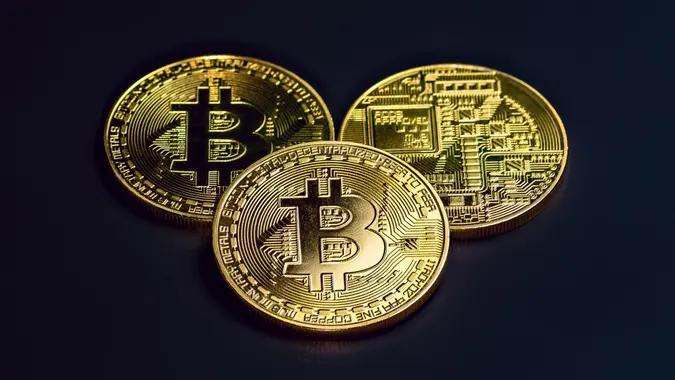Majority of Bitcoin Owners Started Investing in the Past Year, Grayscale Study Finds

Commitment to Our Readers
GOBankingRates' editorial team is committed to bringing you unbiased reviews and information. We use data-driven methodologies to evaluate financial products and services - our reviews and ratings are not influenced by advertisers. You can read more about our editorial guidelines and our products and services review methodology.

20 Years
Helping You Live Richer

Reviewed
by Experts

Trusted by
Millions of Readers
Demand for Bitcoin has risen in 2021, according to the new Grayscale Bitcoin Investor study, which shows 55% of those polled started investing in the crypto over the past year.
“The findings from this year’s study affirmed a trend we’ve witnessed all year ー the growing mainstream adoption of bitcoin and digital assets, more broadly, marked by heightened focus on this asset class and increased institutional interest and allocations,” David Grider, Grayscale’s Global Head of Research, told GOBankingRates. “26% of surveyed investors noted that they already own Bitcoin, really reinforcing that 2021 was a pivotal year for this ecosystem, at large.”
In fact, the Grayscale Bitcoin Investor study found that the slice of Americans who own bitcoin has increased to 26% in 2021 from 23% in 2020 and most of these investors are “hodling,” with 66% of those who purchased bitcoin more than 12 months ago still owning it today.
In addition, of the investors who have sold, 91% have sold at least some bitcoin at a profit and 77% of U.S. investors said they would be more likely to invest in bitcoin if an ETF existed.
Bitcoin is Hard to Ignore
The study notes that it is becoming increasingly difficult for investors to ignore Bitcoin as its price continues to rise.
“The interested market for Bitcoin investment products expanded to 59% in 2021, up from just over half (55%) in 2020 and slightly more than one-third (36%) in 2019, reflecting a steady growth in interest,” reads the study.
In terms of perception, there has also been a huge shift: investors have shown a clear preference for Bitcoin as an investment through which they can accumulate long-term returns, as opposed to a currency for making payments. This is a notable shift from 2020, when Bitcoin as a currency was top of mind for investors more than any other use case, according to the study.
This year, however, three times as many investors would consider owning Bitcoin as a store-of-value investment, rather than as a currency. Among them, 37% perceive Bitcoin as a short-term investment to hold for less than one year through which they can earn a “quick buck.”
Grider told GOBankingRates that while in the developing markets people are more likely to see digital assets used as currency, as evidenced by El Salvador’s recent decision to make Bitcoin legal tender, in the developed markets we are increasingly seeing digital assets viewed more as a store of value or hedge against inflation, akin to digital gold.
Investors are embracing Bitcoin and worry less than they did in previous years about the risks. Chief among them are cyberattacks with 58%, volatility, with 53% and regulation, with 51%.
The channel by which investors prefer to buy Bitcoin has also evolved during this period. In 2020, more than three-quarters of investors preferred buying directly via a Bitcoin exchange, whereas in 2021, 59% of investors expressed a preference for buying Bitcoin through a cryptocurrency trading app, and 35% of investors expressed a preference to buy Bitcoin directly through an exchange.
Use of Fintech Applications is on the Rise
In addition, investors are increasingly using fintech applications to gain their cryptocurrency exposure. For example, 30% of investors chose to buy Bitcoin with a digital wallet or money app, such as Venmo or CashApp. The rise in investors purchasing Bitcoin through existing fintech applications is undoubtedly a key driver for PayPal, one of the largest fintechs on the market, supporting Bitcoin last year, the study notes.
CEO of Bittrex Global Stephen Stonberg told GOBankingRates that the study uncovers valuable insight on how Bitcoin’s adoption successfully transcended into the mainstream this year.
“It isn’t surprising that existing fintech applications, such as Venmo and Paypal, have played a large role in bringing new people to the cryptocurrency world. Of course, it is also not surprising to see that the majority of people prefer to buy, sell, and hold their crypto with exchanges, like Bittrex Global, — particularly because they can provide a safe, secure, and regulated environment to hold crypto,” Stonberg added.
Bitcoin is No Longer Just For Millennials
In terms of demographics, the study notes that the notion that Bitcoin is exclusively a millennial phenomenon no longer reflects reality, and in fact, among investors who have shown an interest in bitcoin investment products, the greatest increase in 2021 was among older investors.
Ron Levy, CEO and co-founder of The Crypto Company, told GOBankingRates that the study underscores how crypto is an exciting and growing asset class.
“It accurately puts in perspective Bitcoin’s role as a door opener for the acceptance of cryptocurrency into our culture and the world especially as it’s crossing generations,” Levy said.
Women are Investing in Bitcoin More
Also noteworthy is the percentage of female investors who would consider Bitcoin investment products, which climbed 6% in 2021 vs. 2020 levels, while the segment of male investors in this category stayed relatively flat.
However, interest in Bitcoin investment products is still the most robust among younger, male, investors, the study notes.
“As digital currencies gain more mainstream acceptance, more investors — across demographics — are interested in allocating towards it, including a higher percentage of female investors,” Grayscale’s Grider said.
More From GOBankingRates
 Written by
Written by 

























